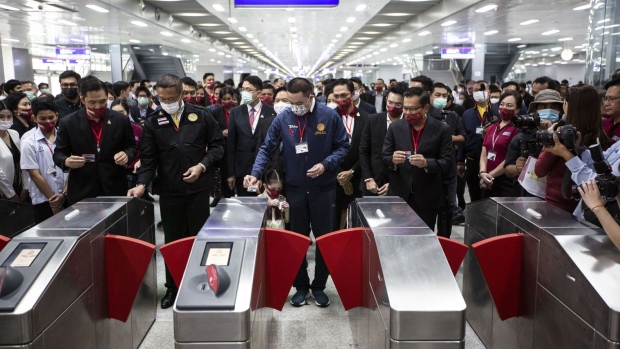
Thailand’s Troubled State Railway Targets $18 Billion in Land Projects
The State Railway of Thailand has set up a company to manage and monetize its most-valuable properties in an effort to reverse decades of losses.
While the idea of generating income from SRT assets has been around for years, the plans are only now taking shape, with prime real estate being transferred to an asset-management unit, Transport Minister Saksayam Chidchob said in an interview.
Set up in 1890 to provide not-for-profit transport services, the rail operator has accumulated about 44,000 hectares (109,000 acres) of land across Thailand — and racked up billions in liabilities through money-losing operations. The SRT is among the most-indebted state agencies and country’s largest property owners.
The asset agency should deliver at least 600 billion baht ($17.9 billion) in additional revenue over the next 30 years, offsetting nearly all accumulated and operational losses, Saksayam said. Several trophy properties, especially in central Bangkok, are probably more valuable than current appraisals if they can be developed into high-rise, mixed-use projects, he said.
The SRT had a combined loss from operations of nearly 40 billion baht in the three years leading up to the pandemic, according to figures from its annual reports. And this past July, the prime minister ordered a panel to probe bidding on two rail projects worth about $4 billion after complaints by the Anti-Corruption Organization of Thailand and politicians.
“Given SRT’s track record of inefficiency, it’s difficult to see how plans on non-core operations could sustainably reverse losses in core activities,” said Pavida Pananond, professor at Thammasat University’s Department of International Business, Logistics and Transport. Focus should be on managing its transport services for people and freight, not property development, she said.
Saksayam said establishment of the asset division is just part of a program to modernize the rail enterprise. Other plans include allowing private companies to use SRT lines to transport freight and people, and adding battery-powered trains to supplement diesel-powered services, he said.
An example of development possibilities is the Bang Sue Grand Station, SRT’s just-opened $1.3 billion hub in central Bangkok that replaced a century-old terminus a few miles away. The main building is as big as 40 soccer fields, and is surrounded by vacant land that the transport minister said is ideal for offices, malls and housing.
So far, most Grand Station passengers are from Bangkok’s urban-transport systems, but the facility will eventually host trains going north to China and south to Singapore. In the meantime, it’s also Thailand’s largest site for Covid-19 vaccinations.
The minister compared the new asset-management division to efforts by the Japan Railways Group that helped transform that enterprise’s finances and operations. If the SRT’s effort is successful, he said the rail operator could become more valuable than Airports of Thailand Pcl, now the country’s second-largest listed company by market capitalization.
Source: https://www.bnnbloomberg.ca/troubled-thai-state-railway-targets-18-billion-in-land-projects-1.1657678


